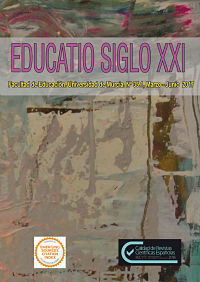Educación rural y la adquisición de competencias laborales: una innovación mediante el uso de recursos digitales
Resumen
El presente artículo muestra un estudio realizado con el objetivo de conocer las percepciones de los participantes sobre la implementación de recursos tecnológicos en las instituciones educativas para el desarrollo de competencias laborales en el sector agrícola. Se realizó la implementación de dos recursos tecnológicos: Redes Sociales y Biblioteca Digital. La investigación se llevó a cabo aplicando el método mixto en un diseño convergente paralelo,
por medio de tres instrumentos: encuesta de caracterización, entrevista a grupo focal, y encuesta de satisfacción de herramientas, en tres Instituciones ubicadas en el Departamento de Cundinamarca, Colombia, donde participaron 63 estudiantes de entre los 14 y 17 años de edad de los grupos del grado 10°. Los resultados permitieron establecer tres criterios que influyen en procesos de innovación mediante el uso de herramientas tecnológicas. El primer criterio se relaciona con las Competencias Laborales, las cuales generan oportunidades, arraigo y sentido de pertenencia de los estudiantes frente a sus regiones y sitios de ubicación y también generan opciones de mejor calidad de vida. El segundo criterio se estableció con respecto a los contenidos para la interacción de los estudiantes deben manejar temas relevantes. El tercer criterio se refiere al mejoramiento de la estructura tecnológica, ya que las falencias en conectividad limitan el manejo de los recursos tecnológicos. Se concluye que es necesario adaptar los procesos educativos a las condiciones y contexto de los estudiantes.
Descargas
-
Resumen2028
-
PDF1071
Las obras que se publican en esta revista están sujetas a los siguientes términos:
1. El Servicio de Publicaciones de la Universidad de Murcia (la editorial) conserva los derechos patrimoniales (copyright) de las obras publicadas, y favorece y permite la reutilización de las mismas bajo la licencia de uso indicada en el punto 2.
2. Las obras se publican en la edición electrónica de la revista bajo una licencia Creative Commons Reconocimiento-NoComercial-SinObraDerivada 4.0 Internacional (texto legal). Se pueden copiar, usar, difundir, transmitir y exponer públicamente, siempre que: i) se cite la autoría y la fuente original de su publicación (revista, editorial y URL de la obra); ii) no se usen para fines comerciales; iii) se mencione la existencia y especificaciones de esta licencia de uso.
3. Condiciones de auto-archivo. Se permite y se anima a los autores a difundir electrónicamente las versiones pre-print (versión antes de ser evaluada) y/o post-print (versión evaluada y aceptada para su publicación) de sus obras antes de su publicación, ya que favorece su circulación y difusión más temprana y con ello un posible aumento en su citación y alcance entre la comunidad académica. Color RoMEO: verde.











